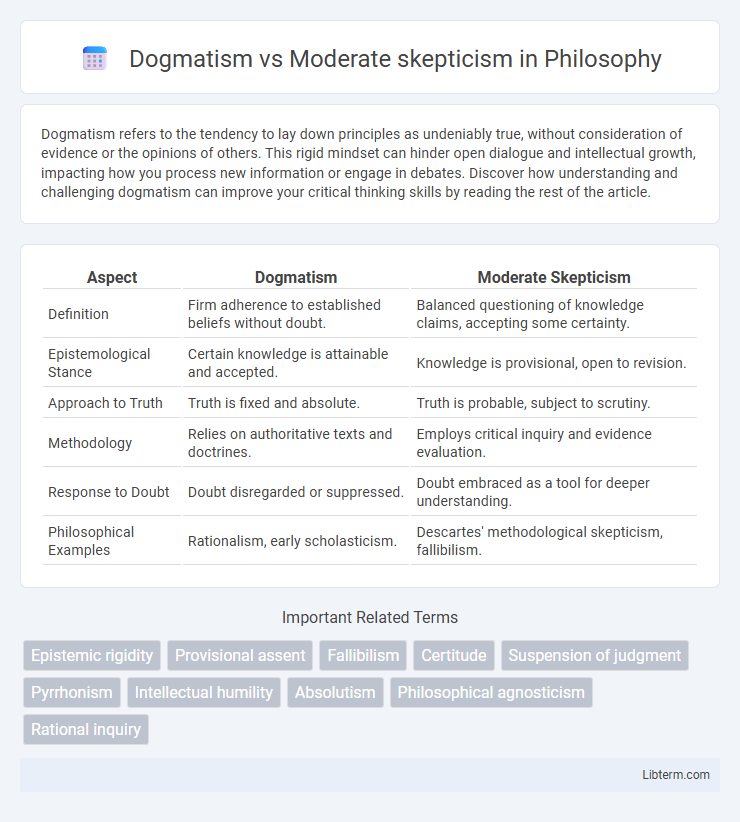Dogmatism refers to the tendency to lay down principles as undeniably true, without consideration of evidence or the opinions of others. This rigid mindset can hinder open dialogue and intellectual growth, impacting how you process new information or engage in debates. Discover how understanding and challenging dogmatism can improve your critical thinking skills by reading the rest of the article.
Table of Comparison
| Aspect | Dogmatism | Moderate Skepticism |
|---|---|---|
| Definition | Firm adherence to established beliefs without doubt. | Balanced questioning of knowledge claims, accepting some certainty. |
| Epistemological Stance | Certain knowledge is attainable and accepted. | Knowledge is provisional, open to revision. |
| Approach to Truth | Truth is fixed and absolute. | Truth is probable, subject to scrutiny. |
| Methodology | Relies on authoritative texts and doctrines. | Employs critical inquiry and evidence evaluation. |
| Response to Doubt | Doubt disregarded or suppressed. | Doubt embraced as a tool for deeper understanding. |
| Philosophical Examples | Rationalism, early scholasticism. | Descartes' methodological skepticism, fallibilism. |
Defining Dogmatism and Moderate Skepticism
Dogmatism asserts firm, unwavering beliefs, often dismissing opposing viewpoints without critical evaluation, emphasizing certainty and a fixed perspective. Moderate skepticism encourages questioning and open-minded inquiry, balancing doubt with reasonable acceptance of knowledge while avoiding extreme skepticism that denies all certainty. Defining dogmatism involves rigid conviction, whereas moderate skepticism promotes cautious evaluation and ongoing intellectual flexibility.
Historical Roots of Dogmatism
Dogmatism traces its historical roots to ancient Greek philosophy, particularly within the teachings of Plato and Aristotle, who emphasized certainty and fixed truths. The Stoics further developed dogmatic principles by asserting the existence of absolute knowledge based on reason and natural law. This contrasts with moderate skepticism, which emerged from Pyrrhonian skepticism, advocating for suspension of judgment and questioning the possibility of certain knowledge.
The Emergence of Moderate Skepticism
The emergence of moderate skepticism arose as a balanced response to dogmatism, emphasizing critical inquiry while avoiding radical doubt. This approach advocates for questioning beliefs based on evidence and reason without entirely rejecting the possibility of knowledge. By integrating empirical observation with cautious judgment, moderate skepticism fosters a more pragmatic epistemology that challenges absolute certainty while maintaining openness to justified beliefs.
Core Principles of Dogmatic Thinking
Dogmatic thinking centers on absolute certainty and unwavering belief in specific doctrines, rejecting opposing views regardless of evidence. It often relies on rigid adherence to established rules, authority, or tradition as the foundation of knowledge. This core principle contrasts sharply with moderate skepticism, which encourages questioning and evaluation of beliefs while remaining open to new information.
The Foundations of Moderate Skepticism
The Foundations of Moderate Skepticism rest on the systematic questioning of knowledge claims while recognizing the possibility of justified beliefs. This approach balances between Dogmatism's unyielding certainty and Radical Skepticism's total doubt, promoting critical inquiry without dismissing foundational truths. Core principles include the reliance on reasoned evidence and the openness to revising beliefs when confronted with new, credible information.
Impacts on Knowledge and Belief Systems
Dogmatism restricts knowledge growth by rigidly adhering to fixed beliefs, often rejecting new evidence that challenges established views. Moderate skepticism encourages ongoing inquiry and critical evaluation, fostering a dynamic belief system more resilient to error and bias. Consequently, moderate skepticism promotes intellectual humility and adaptability, enhancing the reliability and depth of knowledge.
Dogmatism in Modern Society
Dogmatism in modern society often manifests as rigid adherence to beliefs despite contradictory evidence, hindering open-minded discourse and intellectual progress. It fuels polarization by solidifying ideological divides, making compromise and critical thinking more challenging across social, political, and cultural arenas. The persistence of dogmatic attitudes undermines democratic principles by discouraging questioning and suppressing diverse perspectives essential for innovation and collective problem-solving.
The Role of Moderate Skepticism in Critical Thinking
Moderate skepticism plays a crucial role in critical thinking by encouraging a balanced approach to evaluating information, avoiding the extremes of dogmatism's absolute certainty and radical skepticism's excessive doubt. It fosters open-minded inquiry and the continuous reassessment of beliefs based on evidence and reason, enhancing intellectual humility and adaptability. This stance helps individuals make more informed decisions and reduces the risk of cognitive biases inherent in rigid or overly doubtful positions.
Comparative Strengths and Weaknesses
Dogmatism offers intellectual certainty and a clear framework for beliefs but risks rigidity and resistance to new evidence, limiting adaptability. Moderate skepticism encourages ongoing inquiry and openness to revision, enhancing critical thinking yet may lead to indecision or excessive doubt. Balancing both approaches allows for confident knowledge acquisition while remaining receptive to alternative perspectives and corrections.
Bridging the Divide: Towards Intellectual Balance
Bridging the divide between dogmatism and moderate skepticism involves embracing intellectual humility while maintaining a commitment to evidence-based beliefs. Dogmatism's rigid certainty limits open inquiry, whereas moderate skepticism encourages questioning without descending into cynicism. Achieving intellectual balance requires fostering critical thinking that values both conviction and doubt, promoting a nuanced understanding of complex issues.
Dogmatism Infographic

 libterm.com
libterm.com